Backstage at the Oscars: 2016
Okay, so where am I?
It’s late February so that means that I’m on the red carpet at the Academy Awards®, awash with the symphonic melody of whirling cameras, screaming photographers and swooning fans.
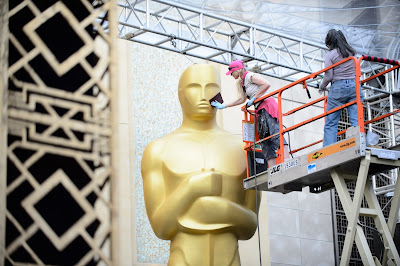 |
| The statues need a good polish / credit: Richard Harbaugh / ©A.M.P.A.S. |
Usually I begin my Oscars® Backstage column with an ode to my agent and my annual phone call imploring him to draw a map for me so I can earn my own eight-pound 24K statuette. This year? I got voice mail. Time for a new agent?
To be continued…
After his two-word reply (“I will”), I was buoyed by the prospects. Multiple scripts in hand and a fully rehearsed Oscars acceptance speech in hand has gotten me nothing.
Without further droning on, here’s my take on the the happenings backstage at the 88th Academy Awards:
 |
| credit: Michael Yada / ©A.M.P.A.S. |
BACKSTAGE INTERVIEW WITH:
Brie Larson, Room
Performance by an Actress in a Leading Role
Q. You talked a lot about your journey and what it’s taken to get here today. What advice would you give to people who haven’t achieved their dreams yet?
A. Oh, any dream?
Q. Any dream.
A. Any dream. Oy, that’s a hard one. You just have to do it. I mean, I wish that there was any sort of rules or code, but in fact, I think the way you get there is by breaking it, by listening to what’s happening inside of yourself. I personally had many moments of crossroads, probably hundreds of moments of crossroads where I could go the way that people were telling me to go, or I could go the way that felt right within me. And it took me 20 years to be standing here on this stage, but I wouldn’t want it any other way: To be so grateful for all of the hardships that it took to get here and to not be discouraged by it. I think to live this life it’s a bizarre combination of being plastic and incredibly stubborn and also really curious about what this life holds; to have no expectation, but to have an idea about a beautiful horizon that’s in front of [you and|and you] constantly moving towards it.
Q. Can you give an example in your career of a time where you feel like you really learned to stand up for yourself?
 |
| The Media Guy at the Oscars – five straight years. |
A. Oh, I mean, many times. In particular, there were many times that I would go into auditions and casting directors would say, It’s really great. Really love what you’re doing, but we’d love for you to come back in a jean miniskirt and high heels, and those were always moments of a real fork in the road, because I had no ‑‑ there’s no reason for me to show up in a jean miniskirt and heels other than the fact that you want to create some fantasy, and you want to have this moment that you can reject. That’s the craziest part. And so for me, I ‑‑ I personally always rejected that moment. I tried maybe once, and it always made me feel terrible because they were asking me to wear a jean miniskirt and heels to be sexy, but a jean miniskirt and heels does not make me feel sexy. It makes me feel uncomfortable. So learning for me what it took to feel confident, and strong, and take what these people were trying to get to exude out of me come from a personal place, and from my place, and trying to represent in film women that I know, women that I understand, complicated women, women that are inside of me, that became my mission. And every time I was put in front of an opportunity where I had to decide in those moments, do I or do I not wear a jean miniskirt? They became huge moments for me of confidence.
Q. I just wanted to ask a question. With SPOTLIGHT winning Best Picture, one of the really devastating scenes in ROOM was involving the media, and I read that that was an important scene to you, and I just wondered if you could expand on that and say kind of how you feel about that.
A. Ooh, about the media, to a bunch of media people?
Q. Well, that scene specifically.
A. Okay. Ballsy. Yeah. It ‑‑ it’s an important thing to me because boundaries are really difficult to create for yourself, and especially if you are not somebody like my character I’m playing in ROOM who is not seasoned in boundaries and isn’t as aware. Like a lot of us in the industry, if we watch that scene in the movie, we can kind of see the train coming, and we know, Oh, this is going to be too much. She’s not ready for this. But for her, there’s no one there that’s on the inside that’s explaining to her that she has strength and boundaries, and that this is not a proper way of going about this next phase in her life. So I think from the journalist’ point of view, always remembering that we are human beings. We are sensitive, loving human beings that deeply at the core of ourselves are worried that we are unlovable. And I think if we can constantly keep that in our heads, especially when we’re interviewing and try instead to get into the soul of a person, and not just worry so much about maybe a earpiece that’s in your ear that’s, you know, your boss telling you that you have to ask something 30 times. I understand that you’re trying to keep your job; but at the same time, we are people, and I think if we can get back to the humanity of this and respect boundaries, we are going to go a long way, and we are going to get real truth instead of performances for TV.
Q. What a wonderful run you’ve had this awards season. You know, you won an Oscar for playing Ma. Unfortunately, many people have been in that situation. What does your Oscar win say for all of the victims out there who have been victimized?
A. You know, I don’t know. I don’t necessarily think an Oscar win changes anything for those women. I do hope that though ‑‑ and in the core of it when we want to talk about feeling trapped, and that can be trapped in a way that is metaphor or a physical representation of that, we want to talk about abuse, the many different ways that we as humans can be abused or feel confined. I hope that this is a story that honestly changes people and allows them to be free. To me, making this movie was my own search for freedom and breaking free of my own personal boundaries. And I hope that when people watch this, they realize that they have it in themselves to break free of whatever it is that’s holding them back.
BACKSTAGE INTERVIEW WITH:
Leonardo DiCaprio, The Revenant
Performance by an Actor in a Leading Role
 |
| credit: Michael Yada / ©A.M.P.A.S. |
Q. What do you love about being a storyteller?
A. (Leonardo DiCaprio) Look, I grew up in East Los Angeles. I was very close to the Hollywood studio system. But I felt detached from it my whole life. And to have had parents that have allowed me to be a part of this industry, to take me on auditions every day after school, and to tell stories like this has been my dream ever since I was 4 years old. And this film to me was exemplary in the sense that I got to work with a director. And all the things we spoke about off camera during the making of this movie transferred their way on screen. This was true storytelling. We really got to have a collaborative experience together, and this was a journey that I’ll never forget with Alejandro. It took up, you know, such a large portion of our lives, but as a result, we have a great film to look back on for years to come.
Q. So I would like to know, where are you going to put that Oscar? Yeah, a very easy question. And for you, that second Oscar?
Q. Everyone was cheering in the room here when you won. How was the atmosphere in the room at the ceremony? How does it feel now that it’s a reality and what would you remember as the biggest challenge of this film?
A. I felt very honored, quite frankly. This whole thing has been an amazing experience. And, you know, for me to be able to sit there and not only talk about the film, but to talk about something that I’ve been duly as obsessed with besides cinema, and that’s, you know, our environment and climate change. To be able to speak about that in a platform of, I don’t know, hundreds of millions of people that are watching this, to me, like I said, this is the most existential crisis our civilization has ever known and I wanted to speak out about that tonight because, simultaneously while doing this brilliant film that Alejandro directed, I’ve been doing a documentary about climate change which has brought me to Greenland, to China, to India to speak with the world’s leading experts on this issue. And the time is now. It’s imperative that we act. And I really wanted tonight ‑‑ I feel so overwhelmed with, you know, gratitude for what happened tonight. But I feel there is a ticking clock out there. There’s a sense of urgency that we all must do something proactive about this issue. And certainly with this upcoming election, the truth is this: If you have do not believe in climate change, you do not believe in modern science or empirical truths and you will be on the wrong side of history. And we need to all join together and vote for leaders who care about the future of this civilization and the world as we know it.
Q. It’s been such a long time coming, and it seems like the whole world is rooting for you. The internet, fans, press, there was a WhiteHouse.gov petition to get you an Oscar at one point. Are you conscious of how many people are supporting you? How does it feel that people care so much that you get this Oscar?
A. It all feels incredibly surreal. You know, it’s surreal because you can’t reach out and physically meet everybody. You hear it on the internet, you hear it from other people, and, you know, the truth is, we always strive for the best in what we do. But this year in particular, I’ve been overwhelmed with such support. Really, truly, by so many fans and so many people in the industry. It’s quite shocking, actually. And what can you say except I’m very grateful, I really am.
BACKSTAGE INTERVIEW WITH:
Mark Rylance, Bridge of Spies
Performance by an Actor in a Supporting Role
 |
| credit: Phil McCarten / ©A.M.P.A.S. |
Q. I just wanted to know, one, where will you be putting it, and two, you said in your speech you weren’t sure how the Academy could separate your performances but tonight you outpunched Rocky and I want to know how that feels and if that’s particularly meaningful to you.
A. I don’t know where I’ll put it yet. I don’t feel I ‑‑ I don’t know. I find people who come up and say things, you know, about competing as actors and I know that it’s necessary to make a show out of it, but those actors are so good, I would be happy just to be ‑‑ I feel like more I’m a spokesman when you win than something that’s better than the other nominees. And I know that there’s so many wonderful nominees just outside the five of us: Idris Elba and Paul Dano and all kinds of actors too, so I don’t take it too seriously.
Q. When they announced your name, and they were like Mark R… did you think they were going to say Mark Ruffalo?
A. No, but Mark Ruffalo told me on the Red Carpet that that had happened to him at the BAFTAs, that whoever was giving the award had slowed down after the “R” and a number of people on his team, as people call it, had looked around to congratulate him, and then the dreadful y‑l‑a‑n‑c‑e had come forward and crushed his dreams.
Q. Steven Spielberg actually tried twice before to get you in a movie and you, I can’t believe this, said no. What were those films?
A. That was the same film, EMPIRE OF THE SUN, and he offered me a small part. I think it must have been 1986. And I turned that down, and then he came back and offered me a better part, and I accepted it, but then a theater director who I very much wanted to work with, had wanted to work with for a number of years, also offered me a part. And Steven very nicely said I could step away from the film if I wanted to but I had to tell him in four hours, and I did decide after those four hours to step away and do the season of plays. And though the season of plays didn’t go that well, I met my wife on the first day and now I’ve been able to work with Steven again. So it turned out to be an all right call.
Q. You’ve talked about your speech a little bit. It’s being called one of the classiest of the night so far from what I’m seeing. Did you think about what you would say before you got up there or was it all just in the heat of the moment from your heart?
A. I always think about what I’m going to say, and I choose two or three options. I had to open Sam Wanamaker’s Globe Theatre once and there were seven opening nights, and I had to make a lot of speeches. And I found that if you over‑prepare a speech, it’s like an over‑prepared acting performance. It’s best to have a few different options and a few different endings and beginnings. I almost dropped the whole thing, actually, after the very funny interviews in Compton because I really longed that I was a black actor at that moment receiving an award. But I didn’t drop it. No, I make it up partly, but I know the general things I want to say. I know I wanted to praise Steven and I wanted to praise my fellow nominees and supporting actors generally, because I really enjoy the work of supporting actors when I go to the cinema. And then there were other things I could have said but I didn’t quite get there. No, I actually said some ‑‑ now I’m remembering. I think it’s best to try and be spontaneous with preparation.
Q. For this film did you shoot on location somewhere interesting? Did you get to do anything there and enjoy the location where you shot, or locations?
A. We shot on the Glienicke Bridge in Berlin which is where the actual exchange took place, and it was incredibly cold and we had to wear all kinds of things in our shoes and in our gloves and then Chancellor Merkel came along about 2:00 in the morning, with no hat, no scarf, no gloves, and stayed for about 45 minutes talking with everyone, looking at the camera and everything. She was a little disappointed I didn’t speak Russian, she saw through me right away. But that was very remarkable to make a film of an event that had actually taken place in that space and that’s one of the pleasures of working with someone like Spielberg.
BACKSTAGE INTERVIEW WITH:
Alicia Vikander, The Danish Girl
Performance by an Actress in a Supporting Role
 |
| credit: Michael Yada / ©A.M.P.A.S. |
Q. Do you feel that your success and the success with THE DANISH GIRL will open the door for additional LGBT stories to be told in Hollywood?
A. I definitely hope so. I came on this film only two years ago and I know that this was not an easy film to get made and it has been almost 15 years that one of our producers, Gail, had worked on it and to see kind of the cultural change with just me over the years since I actually finished the film with, I don’t know, with Caitlyn Jenner coming out, with TRANSPARENT and TANGERINE, it’s like a social change and I just wish that ‑‑ in the same way that this film has been so educational for me and with so many people that I got to meet and in preparation for it I hope that it can open up an even wider conversation, if our film can be a part of that discussion.
Q. Can you describe what was your first thought that went through your mind when they announced your name?
A. I’m trying to remember anything that just happened in the last five minutes. I had my mom next to me which was just ‑‑ I used to every night ‑‑ well, this night every year I woke up and set the alarm clock at 2:00 a.m. to watch this to celebrate in a distance film and people behind films, and to have my mom’s hand and to experience being just here in this room has been pretty cool.
Q. Congratulations. Who will you be celebrating with tonight and what will you be doing to celebrate?
A. I hope I’m going to get the chance to go out, have fun and have a glass of wine and meet up with my family and my entire crew that is here and my friends. So, and I even have a shorter dress in front so I can bounce and dance in it, so that’s what I’m going to do.
bring that out in your clothes, which is fun.
Q. There has been a lot of talk about diversity, obviously at the Oscars and in Hollywood in general. I was wondering what your take was on Chris Rock tonight in his opening monologue?
A. I thought he was great. I just admired him. I admire him as a big comedian, and I’m so happy that he came in tonight and just brought up both a lot of laughs and brought a lot of reality issues in the same way and I’m very happy that he is our host tonight.
Q. What piece of advice would you give to young girls around the world?
A. I don’t know. I actually on stage said to my parents who were there and who have always told me, like, you can actually do it and it has been so many doubts and they are still there and I guess because there’s some people who have really ‑‑ [interruption] ‑‑ did I miss something? Well, what I mean is that apparently a lot of things can be possible, things that I would never, ever, ever have believed in and that is only because I have had some incredible women supporting me so that is probably what I wanted to say to some young girls, just keep on doing it, I guess.
BACKSTAGE INTERVIEW WITH:
Alejandro G. Iñárritu, The Revenant
Directing
 |
| credit: Michael Yada / ©A.M.P.A.S. |
Q. What does it mean to win twice in a row?
A. Well, I couldn’t be more happy. Every film is like ‑‑ is like ‑‑ is like a son. So you cannot like more one son than the other. I love this film as I loved BIRDMAN, and I think this experience and sharing this with Leo and with all the nominees, part of the crew that we are celebrating tonight. I think the award that I’m getting is on behalf of all of them and they make possible. So I couldn’t be more happy, especially because we are celebrating tonight, and that’s fantastic.
Q. What do you love about being a storyteller?
A. For me, it just basically I think that life is so uncontrollable. I think we are all the time, you know, it’s impermanent, everything. And I think that storytelling is a way for us to feel, in a way, can confront a huge amount of emotions and possibilities and feel, you know, beautiful and horrible emotions, but always in a way being in a comfortable zone knowing there is another story that can teach us a lot. So it’s a way to control life, you know, to have an oxygen capsule of life without suffering for real, that can teach us for when the time comes, for being in love or do we have a problem, we can suddenly get what is that idea. So storytelling is, I think, oxygen for life that protect us. You know, that’s how I feel.
Q. How does it feel to be the director who finally did this for Leo?
A. I want to say that it’s funny because the conception how a film is being made, I think, is wrong. This is an intervening collaboration. You know, everything is connected. So when Chivo won, we all won. Because what Chivo photographed was the wardrobe, was the makeup, was the performance of Leo, was the ideas of the original. When I won, everybody won. So, I mean, all of the actors, everything. When Leo ‑‑ so I didn’t give nothing to Leo, Leo won by himself. But we are absolutely interdependent, we depend on the other. So every award of every film, honestly, it’s funny enough, as everything in life is, interconnected and it reflects the effort of hundreds of people. So that’s what is amazing about today, that the awards that we won, it is celebrated by all the team no matter if somebody won or not. And truly, that’s very true, when you work for months with a team like that, you know, that we were basically part of the success of any territory. We were all involved in anything.
The Big Four
Oscar-winners Rylance, Larson, DiCaprio and Vikander pose backstage with their Oscar for Achievement in acting:
 |
| credit: Michael Yada / ©A.M.P.A.S. |
Past Oscars Backstage Columns:
2015 – 2014 – 2013 – 2012
NOTES ON THE SCORECARD:
Who wore it better…?
 |
| Heidi Klum…? |
 |
| …or Ann Wedgeworth in Steel Magnolias? |
Emily Blunt and Charlize Theron backstage (notice the Media Guy with the camera on the left side)…
 |
| credit: Monica Almeida/The New York Times |
Leo at the engraving station…
Larson after winning the Oscar for best actress…
 |
| credit: Monica Almeida/The New York Times |
Lady Gaga, barefoot and in a white suit, danced on the balls of her bare feet in the stage right wings as she waited to sing “Til it Happens to You…”
The sexual abuse survivors who had taken the stage behind Lady Gaga screamed, “We love you, Leo!” as he high-fived them. When Larson arrived, the survivors screamed even louder and pumped their fists. “Give us a hug!” they implored the actress, whose film, Room, centered on a sexual abuse survivor. “Yes, yes, yes!” Larson said, rushing into their arms.
After performing, Gaga ran off the stage, down a hallway and around a corner to change her clothes, to be in her seat before the announcement of her category, original song.
These are the droids I was looking for…
Finally, my top six favorites from the red carpet:
And my #1 favorite: Jennifer Lawrence…


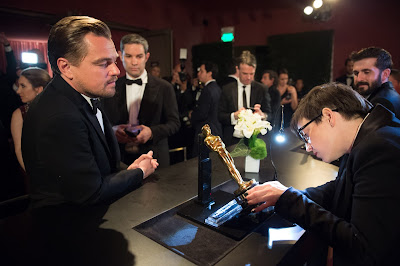

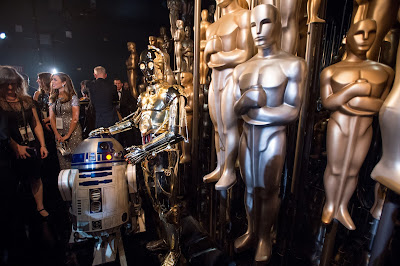
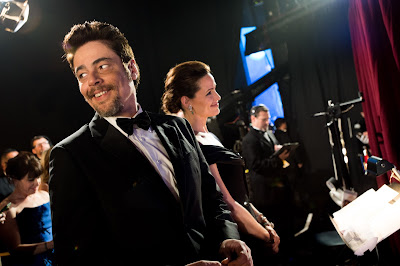








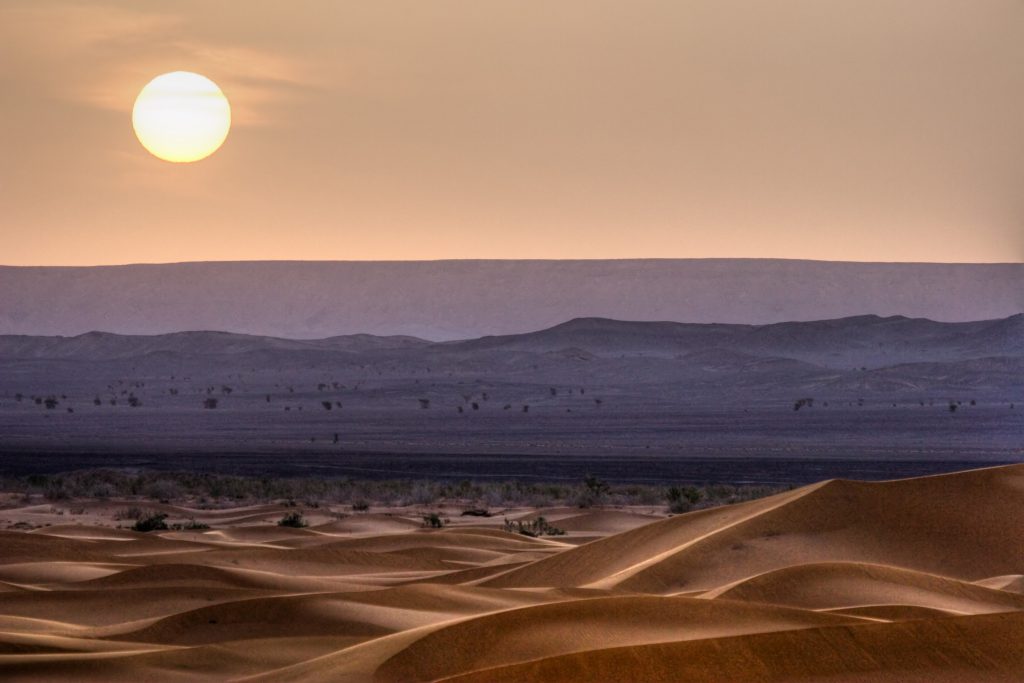
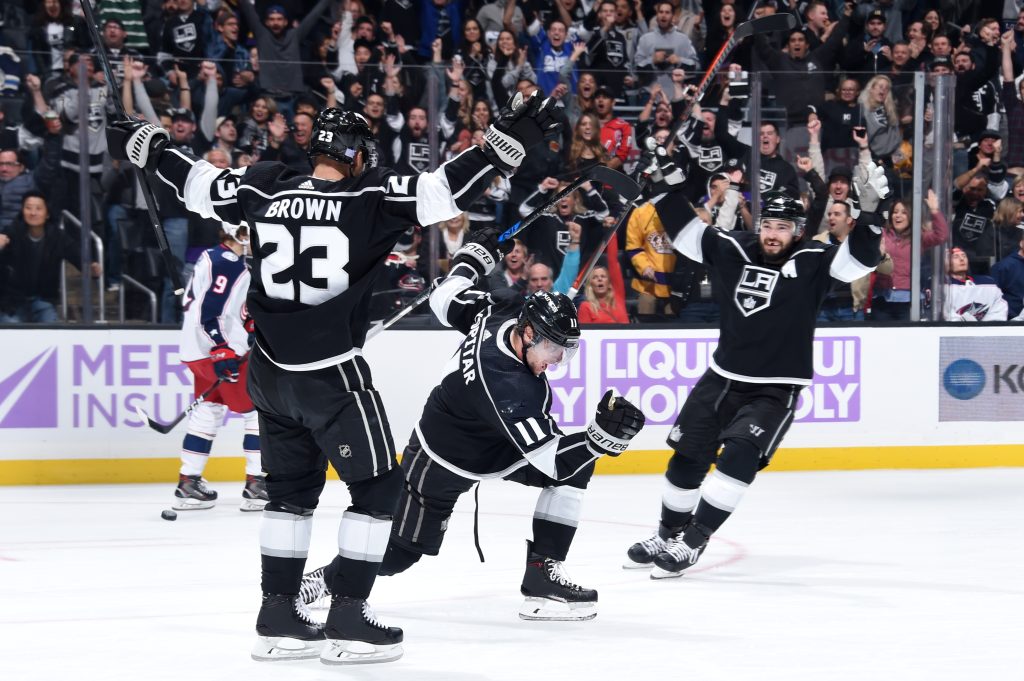
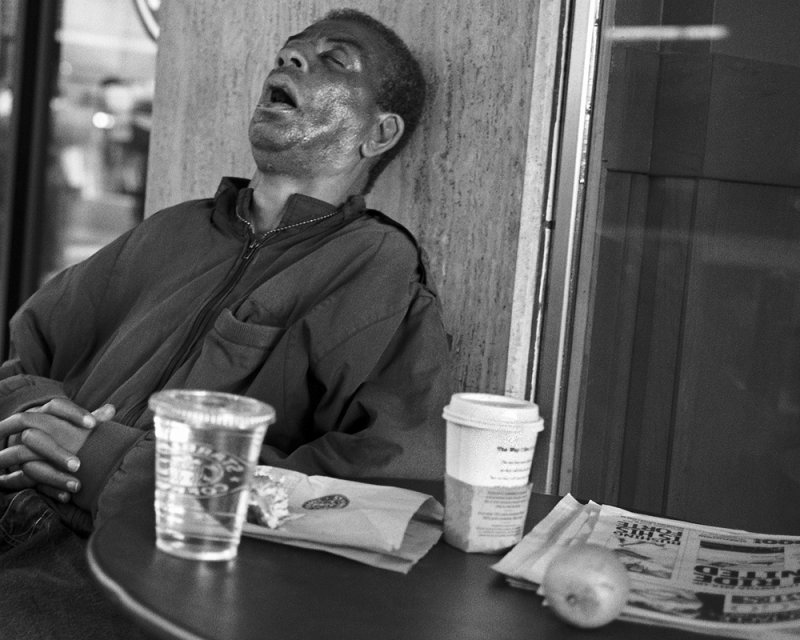


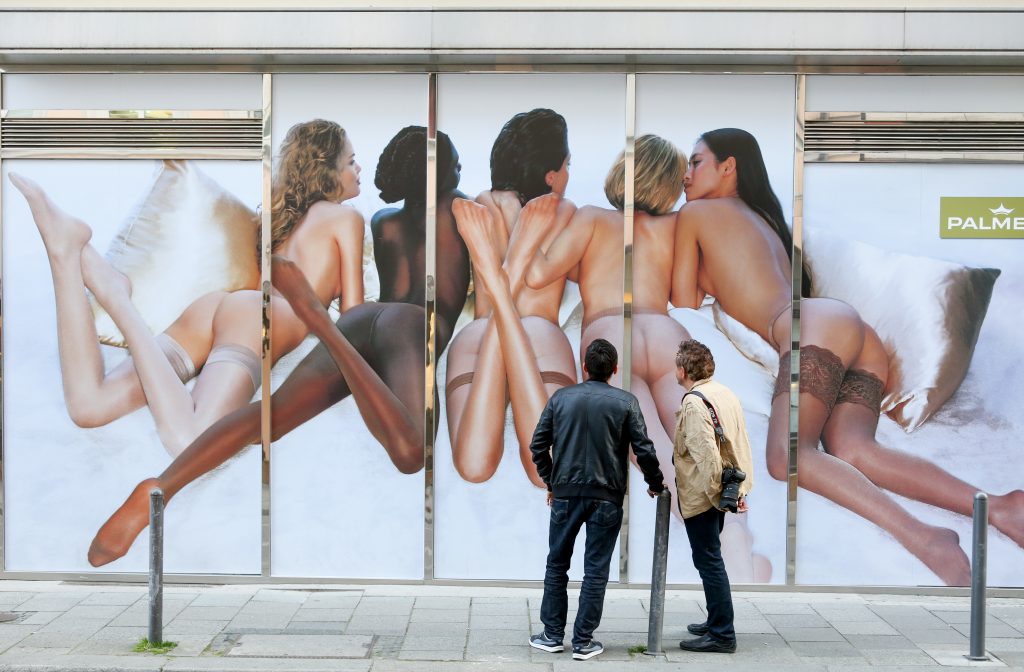

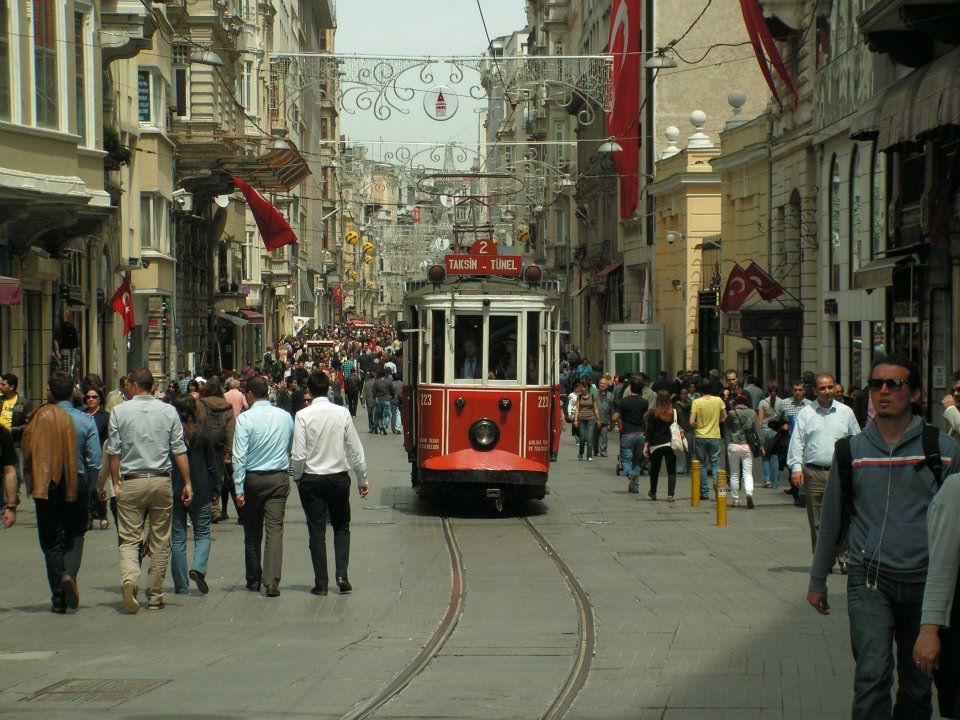
Leave a Reply